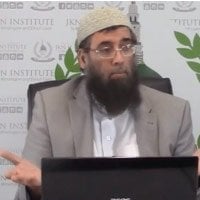The Fiqh of Medicine - Level 1
Course

About The Course
This unique course provides an in-depth introduction to the field of Medical Fiqh and its relationship with Islamic bioethics, for both medical professionals and Muslim scholars. Students will learn principled practical and theological approaches to medical ethical dilemmas. The course will cover key concepts within Islamic theology, usul al-fiqh, epistemology, and fiqh pertaining to modern-day medicine, whilst applying principles discussed in the course to contemporary medical cases.
Course Team
At A Glance
 14 Live Online Sessions
14 Live Online Sessions  Duration: 4+ Months
Duration: 4+ Months  Sundays : 5:00PM - 6:30PM (London, UK)
Sundays : 5:00PM - 6:30PM (London, UK)  Video Recordings Available
Video Recordings Available  Access to Mobile App
Access to Mobile App  Certificate
Certificate  From £27.49/Month (For 4 Months)
From £27.49/Month (For 4 Months)
Enroll Now
- Starts on 10th September 2023
- Course Fee:
Pay in Full:£199.99£99.99
Pay in 4 Installments: £27.49 per month - Registration Deadline: 9th September 2023
Al Balagh Scholarship
AlBalagh Scholarship is available for learners who cannot afford the fee. Learn More and Apply
Course Overview
The course aims to provide both theory and case-based practical advice on some of the most compelling and common medical ethical issues for Muslims. It addresses the fundamental questions affecting health care and allied professionals today.
- Islamic and Western Medical Ethics – An Overview
- Organ Donation and Transplantation - An Overview
- The Fiqh of Organ Donation and Transplantation
Learning Objectives
The objective of this course is to:
- Describe the Islamic legal and ethical perspectives in the light of contemporary medical issues.
- Understand the principles of Islamic Jurisprudence [Usul ul Fiqh] as a basis for the practice of medicine.
Learning Outcomes
By the end of this unique course, the students will:
- Gain knowledge and practical skills that will make them better informed about Islamic bioethics literature.
- Engage in moral reasoning about clinical ethics cases.
Here is the course outline:
Welcome Aboard: Course IntroductionPrepare to navigate the intricate blend of ethics and medical practice. Let's embark on this enlightening voyage together. |
Books And Reading |
Session 1- Introduction to the CourseIntroduction to the Fiqh of Medicine: Exploring the Interplay of Islamic Jurisprudence and Medical Ethics in Healthcare Practices. |
Session 2- Islamic and Western Medical Ethics-An Overview"Islamic and Western Medical Ethics: A Comprehensive Overview of Ethical Perspectives in Healthcare" provides insight into ethical approaches from both traditions. |
Session 3- The Fiqh of Halal and Haram Medicine"The Fiqh of Halal and Haram Medicine: Exploring the Ethics of Permissible and Prohibited Practices in Healthcare." |
Session 4 - Organ Donation and Transplantation - A Concise OverviewIntroduction to Organ Donation and Transplantation: Ethical, Medical, and Legal Aspects in Modern Healthcare Practices. |
Session 5 - Caring for Patients- An Islamic ApproachNurturing Patients with an Islamic Approach: Integrating Faith, Compassion, and Medical Expertise for Holistic Healthcare Delivery. |
Session 6 - Islamic Code of Practice for Medical ProfessionalsIslamic Code of Practice: Guiding Principles for Medical Professionals, Harmonizing Spiritual Values with Ethical Medical Care in Diverse Healthcare Settings. |
Session 7- The Fiqh of Family Planning and Reproductive TechnologyUnderstanding Fiqh of Family Planning & Reproductive Technology: Navigating Islamic Jurisprudence in Ethical Decision-making for Modern Family Health. |
Session 8- Networking Session- No RecordingInformal Networking: Building Connections Through Casual Interactions for Knowledge Exchange, Collaboration, and Professional Growth in a Relaxed Setting. |
Session 9- Historical Development Of Medical Fiqh Resolution CommitteesTracing Medical Fiqh Resolution Committees' Historical Evolution: Analyzing Their Role in Addressing Complex Ethical and Religious Issues in Healthcare. |
Session 10-The Medical Fiqh of FastingMedical Fiqh of Fasting: Exploring Health Considerations, Islamic Rulings, and Practical Guidance for Fasting during Ramadan and Beyond. |
Session 11- The Fiqh of Obstetrics and Gynaecology [Case Studies]Exploring Fiqh of Pharmacy through Case Studies: Ethical Dilemmas, Halal-Haram Considerations, and Shariah Compliance in Pharmaceutical Practices. |
Session 12 - The Fiqh of Pharmacy - [Case Studies]Fiqh of Obstetrics and Gynaecology: Analyzing Islamic Jurisprudence through Case Studies, Navigating Ethical and Religious Aspects in Women's Healthcare. |
Session 13 - The Fiqh of End of Life Care and Withdrawal of Treatment and ApplicationFiqh of Withdrawing & Withholding Life Support: Exploring End-of-Life Ethics, Shariah Perspectives, and Medical Decision-making for Compassionate Care. |
Session 14 - The Fiqh of Withdrawing and Withholding Life Support and End of Life Issues |
Completion
The following certificates are awarded when the course is completed:
 |
The Fiqh of Medicine |




(3).png?lmsauth=401bc9a751a1384a01d518931aef05980231a962)
.jpeg?lmsauth=20c38b738ae72dadfffc864a114a427f837cf07e)




